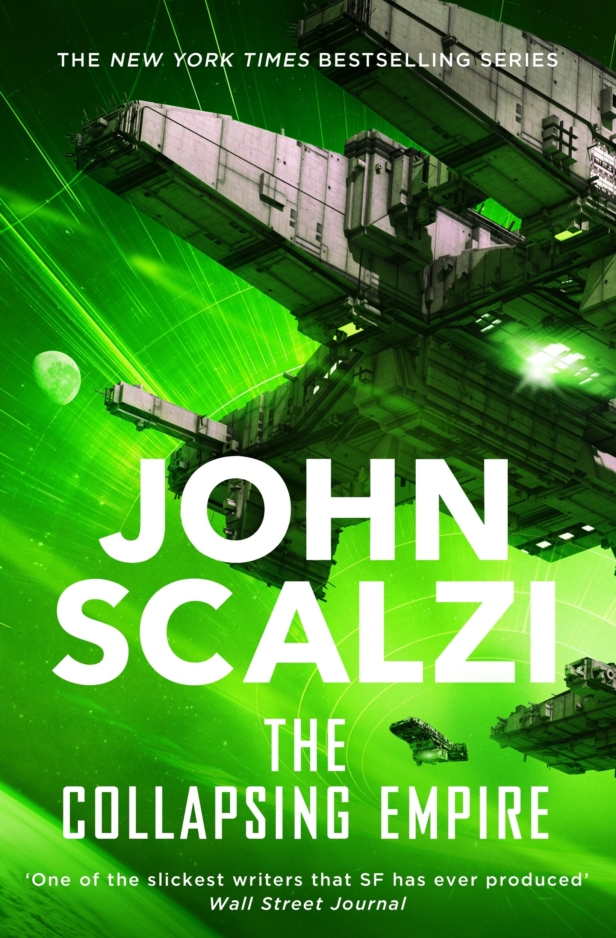Critically acclaimed and award-winning author John Scalzi tells SciFiNow about The Flow, a form of space time travel used in his new novel The Collapsing Empire. Is there any science behind it, and how does it work?
Here is a thing I truly believe: The speed of light is not only the law, it’s a good idea. Which is to say that in this universe in which we live, with the tools we have or are likely to have in the future, it’s simply impossible to get up to the speed of light. It would take up too much energy and would be dangerous in any event, since colliding with anything larger than the merest speck of dust at an appreciable fraction of c would turn your spaceship into explody particles. And that’s just to get near the speed of light — as for getting past it, well. Just not happening. Contact your local expert on relativity for more details.
But therein lies a problem — if you’re writing galaxy-spanning science fiction, as I am with The Collapsing Empire, if you decide you can’t just use a “faster-than-light drive,” how do you get your people from solar system to solar system in a span of time that is reasonable, both for the story and for the poor humans trapped on the spaceships?
In the case of The Collapsing Empire, I took two highly speculative hypotheses — the Alcubierre warp bubble and brane cosmology (look them up, it’s worth your time) — and jammed them together to create The Flow, a multidimensional construct that is separate from but interacts with our universe, which spaceships can enter and be carried along in, and which, because it’s not beholden to the physical laws of our universe, doesn’t have to worry about silly things like the speed of light. This allows ships to travel immense distances in our universe without breaking any of its laws.
“Well, Scalzi, that just sounds like you’re just doing a lot handwaving there,” I hear you say. And you’re correct! That’s exactly what I’m doing. And also, that’s what I’m supposed to be doing — what you call “handwaving” can also be called “speculation,” taking the properties of two interesting but largely untested (and possibly untestable) hypotheses about our universe and manipulating them to arrive at a solution to a problem — how to get people around the universe — in a way that doesn’t ignore physics as we understand it today.
In very simple terms, humans in The Collapsing Empire use The Flow the way someone on a raft might use a river: You launch yourself into it in an accessible area, float along at the speed of the river itself, and exit where you can find a strip of shore. In the case of The Flow, these strips of shore are called “Shoals” — places where The Flow intersects with normal space time, usually near stars, which may or may not have habitable planets circling them. If they do, great. If not, well, humans make do anyway.
And this is one of the things I particularly liked about The Collapsing Empire while I was writing it — instead of being masters of their universe, with the ability to travel anywhere within it at their faster-than-light whim, the human civilization in the book is reliant on, and has built itself around, a natural feature of the multiverse which it has no control of. Like pre-industrial humans clustered around the mighty rivers of the world, and occasionally wiped out by floods or shifting channels, the humans of The Collapsing Empire are at the mercy of The Flow, and how it interacts with our universe. The humans in the book have thought of it as a constant. But it’s never a great idea to think about anything natural as being constant.
Could something like The Flow actually exist in the universe (or more accurately, as I describe it, the multiverse)? Probably not, but it’s certainly been fun to think on and speculate about, and to build a future civilization around. It allowed me to do what I think science fiction is supposed to do: Create fantastic new scenarios for humans, then put some characters in them, say “sink or swim, people!” and then watch how they do. As the writer (and hopefully for you the reader), it’s fascinating. For the characters, possibly, not so much. Sorry, characters. At least you get to see the universe.
The Collapsing Empire by John Scalzi is published by Tor on 23 March in paperback, £7.99.
